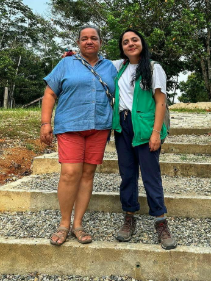“One’s leadership should not be focused only on one part, but I believe that as leaders of women, we have to put ourselves in a framework that is to do good.” -Jani Silva

Introduction
Jani Silva was born in the heart of the Amazon, and from her birth she lived a life interconnected with nature but being at the center of one of the most prosperous jungles also means being at the epicenter of the dangers of the jungle —including the violence of climate change, fractured armed groups forcing the production of coca. In Colombia, Global Witness has recorded that 382 land defenders have lost their lives from 2012-2022 land defenders have been murdered for their work protecting the land and environment. In 2023, Front Line Defenders documented that out of the whole world the region of Latin America accounted for 79% of murders of defenders with Colombia leading as the most dangerous context. The Colombian civil society network Somos Defensores documented that only 5.2% of all killings have been legally resolved. Jani’s roots in the land are deep and expansive, allowing her to continue her work to protect the Amazon while facing tough battles to ensure a better future for her communities.
A Natural Leader
During her adolescence, Jani often accompanied her mother to social movement spaces in the community. She became a valued pillar of the community as one of the few individuals who could read and write well. Throughout the meetings, she heard the troubling stories of injustice happening in her community, pushing her to become more involved as she built relationships with various members. Her work like many defenders began informally but quickly she became the voice of the community reporting human rights abuses and mediating inter-personal relationships even placing herself in harm’s way to do so. Whether as a “rural inspector” responding to calls for help in even the most remote areas ensuring her community was safe was always her priority. Later as the President of the Association for the Integral Sustainable Development of the Perla Amazónica (ADISPA) carrying out the work of territorial management and education—Jani’s commitment to her community’s well-being is powerful.
Protecting Land and Community Against All Odds
In the late 1990s, the place that Jani Silva called home in Putumayo had become a complex intersection of the socio-political struggles of Colombia’s war on drugs. There were coca growers, large-scale fumigation and an increase in military presence which forced Jani’s community to take active steps towards protection; in their case a Peasant Farmer’s Zone. Jani led the way ensuring that each community was consulted in the ideological and technical formation of what would become the Perla Amazónica Peasant Reserve Zone (ZRCPA) at the end of 2000. Several accomplishments have come about due to ADISPA’s work including creating protection for wild animals, new hunting practices, and the dedication of each plot of cultivated land to conservation. Essentially it was a process of reimagination their relationship with nature and the ecosystem within their community. However, armed actors would see these changes in direct opposition to their extractive behaviours and ZRCPA and those involved began to receive threats.
Oil Expansion in the Region
With an increase in threats on the community from multiple angles many community members would be less active. Jani has previously said in interviews that this would cause many to be less active in community organizing in the early 2000s ultimately leaving room for oil companies to slowly encroach on their land. Additionally, it did seem there was an attempt to prevent the contamination of soil and water sources, they asked the companies to use existing oil wells and not to open new ones. However, this did not happen, and the anonymous threats returned when the communities made their first complaints however due to the complicated past it was hard for individuals to understand the prioritization of environmental safeguarding while others saw the oil companies as employers and development for the region. ZRCPA alleged that the company has not respected its commitment to repair the environmental damage caused and unauthorized expansion within ZRCPA.
Decades of Resilience
With over four decades of protecting environmental and human rights in Putumayo Jani has faced severe repercussions for her work. PBI has been accompanying her throughout her career and has built a strong relationship of which Jani remarked PBI’s impact, “when we have large events and PBI isn’t there I feel that I am unprotected.” She was an outspoken supporter of Colombia’s 2016 peace accords specifically in relation to crop substitution programs. In 2018, the IACHR requested precautionary protective measures for Jani as well other in her community. Jani is also under protection through the National Protection Unit under the Ministry of the Interior of Colombia but even these measures have not shielded her from being displaced. In July of 2021 after the Justice and Peace Commission who also accompanied Jani uncovered a plot to murder Jani an armed group. As recently as September of this year she received a phone call threatening to “blow you up, car and all.” These documented attacks along with all other threats caused psychological stress and harm including surveillance by the military and armed groups and intimidation by sounding gunshots near her home. Despite it all, she remains steadfast in her commitment to change.
Conclusion
Her decades of work and the risks she takes to protect her community, the land, and our shared planet have been recognized through nominations for the Nobel Peace Prize. However, what gives her the most hope is the younger people in her own community who are embracing different ways of living. From integrating organic vegetable gardening or learning to not throw candy wrappers on the ground, the youth will be the ones leading the way. For Jani, it is incredibly important to acknowledge the past and to heal but she is looking forward to a better and brighter version of what the world could be.

